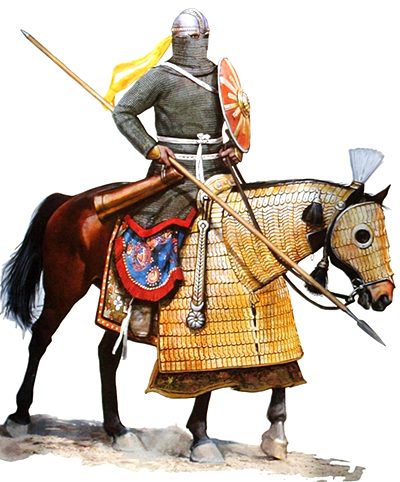
Battle of Callinicum |
year: 53119 April 531 |
| A Byzantine defeat by the Persians with heavy losses for both sides | ★ ★ ★ ★ ★ |
|
enemy: Sassanid Persians
|
location: Near the city of Callinicum by the Euphrates river, today Ar-Raqqah, North Syria
|
accuracy:
●●●●●
|
|
battle type: Pitched battle |
war: Iberian War (526-532) |
modern country:
Syria |
| ▼ The Byzantines(emperor: Justinian I) | ▼ The Enemies | |
| Commander: | Generals Belisarius & Hermogenes | Azarethes |
| Forces: | 20,000 (incl. 3,000 Ghassanid Arabs) | 15,000 cavalry plus 5,000 Lakhmid Arabs |
| Losses: | Heavy | Heavy |
| Background story: |
| After their defeat at the Battle of Daras, the Sassanids moved to invade Syria in an attempt to turn the tide of the war. The Byzantines blocked the Persian advance and the Persians under Azareth -commander of Mesopotamia- were forced to withdraw and retreated down the west bank of the Euphrates. The Byzantines followed them to the east. Initially, Belisarius only wanted to drive off the Persians, without a risky battle. His troops, however, were restless, and grew impatient for a fight. After failing to convince his men, and realizing they would mutiny unless he agreed, Belisarius prepared his force for battle near the frontier at Callinicum (Ar-Raqqah). |
The Battle: |
 Persian cataphract horseman The Persian cavalry broke through the Roman right flank, composed of Ghassanids, with surprising force such that the Ghassanids were accused of treachery after they fled. With his right flank gone, Belisarius was forced to retreat in an effort to re-form his line, but the retreat was followed and soon the Romans found themselves pressed against the river. There, the Byzantines were able to resist and withdraw much of their army across the river. The Persians attacked for several hours, but were repulsed with heavy casualties by the dedicated line of Byzantine troops led directly by Belisarius. Eventually, the Persians gave up, and Belisarius completed his retreat. |
Aftermath: |
| Callinicum ended the first of Belisarius' Persian campaigns. The losses were so heavy, that neither army was in position to continue the war. As a result, a peace treaty was signed in 532 (Eternal Peace). The peace lasted until 540. |
|
|
